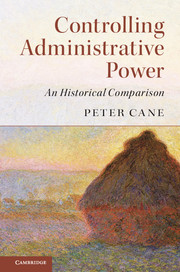Book contents
- Frontmatter
- Dedication
- Contents
- Preface
- Table of cases
- Table of legislation
- 1 Introduction: concepts and methodology
- 2 The English system of government
- 3 The US system of government
- 4 The Australian system of government
- 5 The development and institutional structure of control regimes
- 6 Administrative interpretation
- 7 Administrative fact-finding and policy-making
- 8 Administrative rule-making
- 9 Administrative adjudication
- 10 Private law controls
- 11 Controlling information
- 12 The New PublicManagement
- 13 Controlling the controllers
- 14 Concluding reflections on methodology and themes
- Bibliography
- Index
10 - Private law controls
Published online by Cambridge University Press: 05 March 2016
- Frontmatter
- Dedication
- Contents
- Preface
- Table of cases
- Table of legislation
- 1 Introduction: concepts and methodology
- 2 The English system of government
- 3 The US system of government
- 4 The Australian system of government
- 5 The development and institutional structure of control regimes
- 6 Administrative interpretation
- 7 Administrative fact-finding and policy-making
- 8 Administrative rule-making
- 9 Administrative adjudication
- 10 Private law controls
- 11 Controlling information
- 12 The New PublicManagement
- 13 Controlling the controllers
- 14 Concluding reflections on methodology and themes
- Bibliography
- Index
Summary
This chapter is about the role of tort law and the law of contract in controlling the exercise of administrative power. Historically, tort law and contract law were made mainly by courts, and they were ‘private’ in the sense that they were concerned primarily with regulating relations between individuals, not relations between individuals and ‘the government’ understood in a non-individualistic (‘corporate’ or ‘metaphysical’) way, or between organs of government. Contract law is not only a means of controlling administrative power but also a source of power in the sense that it gives legal force to certain sorts of mutual agreements, including agreements to which one party is, or both parties are, government agencies. Agreements that do not have the force of law because they are not recognised by the law (of contract) also play an important role in regulating relations between organs of government. Such agreements may have great political force, and they receive incidental treatment in Chapter 12.
Tort
Introduction
The most striking difference in this area between US law on the one hand, and English and Australian law on the other, is the central role of the concept of ‘sovereign immunity’ in US law. This section offers an explanation of this and related differences in terms of a distinction between two models of the tort liability of public functionaries, namely, a private law model and a public law model. In a pure private law model, private tort law, i.e. tort law as it applies to relations between private individuals, would apply unmodified to relations between private individuals and public functionaries. In a pure public law model, there would be a categorical distinction between private tort law applicable to relations between private individuals and public tort law applicable to relations between private individuals and public functionaries. This is not to say that in a pure public law model, private tort law and public tort law would not share common features. However, in this model, unlike the pure private law model, public tort law would be understood as a legal category distinct from and autonomous of private tort law rather than as an application of private tort law to relations between private individuals and public functionaries.
The distinction I will draw in this section is not between a pure private law model and a pure public law model but between hybrid versions of these two models.
- Type
- Chapter
- Information
- Controlling Administrative PowerAn Historical Comparison, pp. 368 - 414Publisher: Cambridge University PressPrint publication year: 2016



